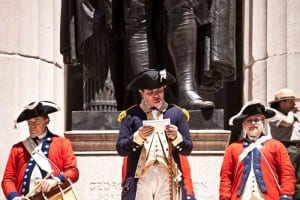CHARLOTTESVILLE, VA – Archaeologist and historian Dusty Bookman announced on Thursday that he unearthed a lost draft of the Declaration of Independence among Thomas Jefferson’s documents.

The newly-discovered document focuses heavily on access to pain medications, rather than political freedoms. The body of the work, or so-called Indictment section, focuses on ways in which King George III and the British Empire impaired access to opioid preparations of the time, such as laudanum. For example, the Indictment includes the following accusations:
- “King George denied laudanum refill shipments to the Colonies.”
- “He instituted opioid-prescription monitoring Programmes in Massachusetts and Pennsylvania.”
- “Royal Physicians refused to acknowledge numbers higher than Ten on the Pain Level Scale.”
The lost version of the Declaration predates by only a few days the version currently published in history textbooks and on display in the National Archives. Bookman hypothesized that key passages were redacted from the document Benjamin Rush and Josiah Bartlett, two of the five physicians who were signatories to the Declaration. The opioid-related sections were deleted or substituted prior to press on July 4, 1776. The most obvious modification was the substitution of “pursuit of Happiness” in place of “opioid pain Medicine,” based on handwriting analyses by Bookman.
Why the focus on opioid compounds in the earlier Declaration? Jefferson is reported to have grown poppies, a source of opium, at Monticello. He also may have been an opioid aficionado and “doctor shopper.” A newly uncovered letter from Bartlett to Rush alleged that “he [Jefferson] perpetually complains of Terrible Pains all over that respond only to ‘Laud-something-or-other.’ By means of Artifice he seeks to feign forgetfulness of the name laudanum, but it is quite clear to this Physician that he wants me to prescribe Tincture of Laudanum instead of more Appropriate Remedies.” The physician members of the Continental Congress were likely so “incensed at Jefferson’s drug-seeking, that they espoused stronger personal freedoms as a last-minute substitution” to salvage the Declaration, theorized Bookman. “Well, the rest is history,” he chuckled.
GomerBlog reached Burt B. Leegird, MD, Director of the ER at Monticello Regional Hospital, for his thoughts on these historic revelations. Dr. Leegird refused to issue any comments other than, “I think I’m going to put a bowl of Percocets in the waiting room and call in sick for the next few days.”